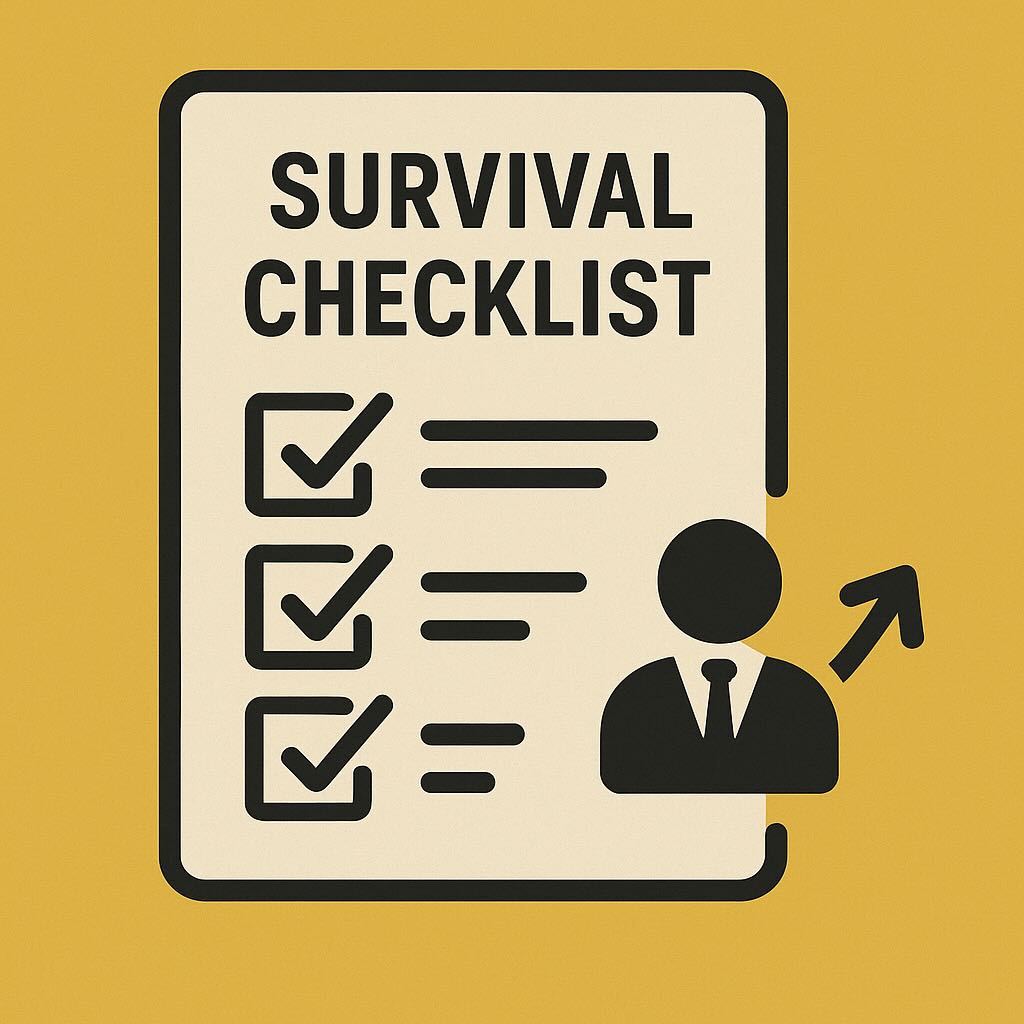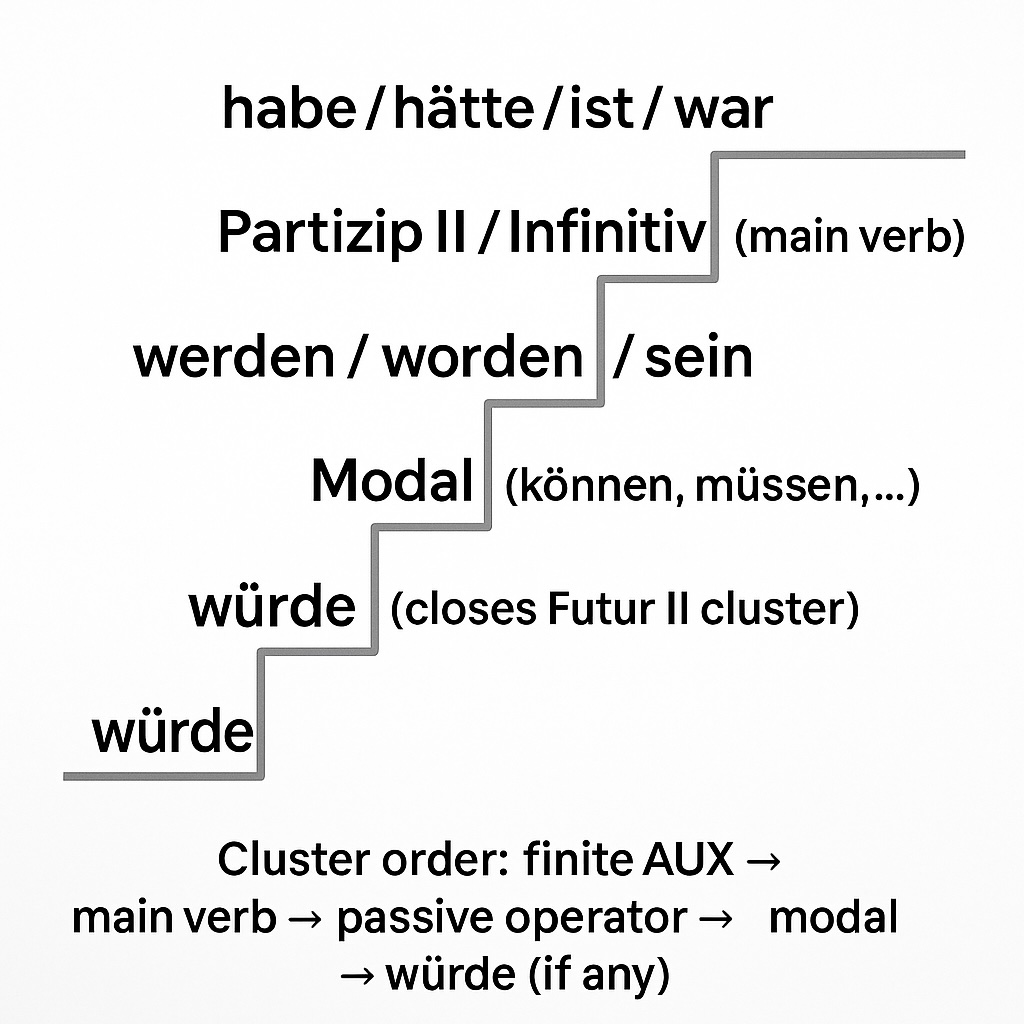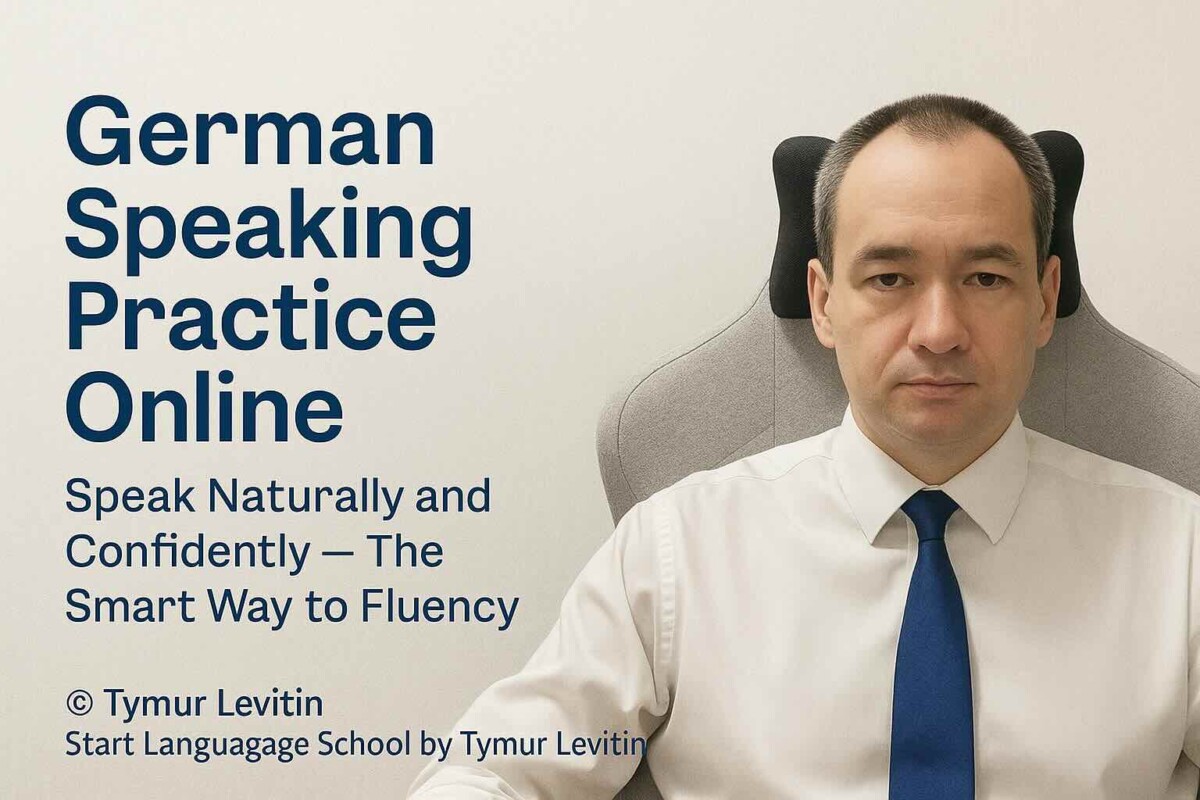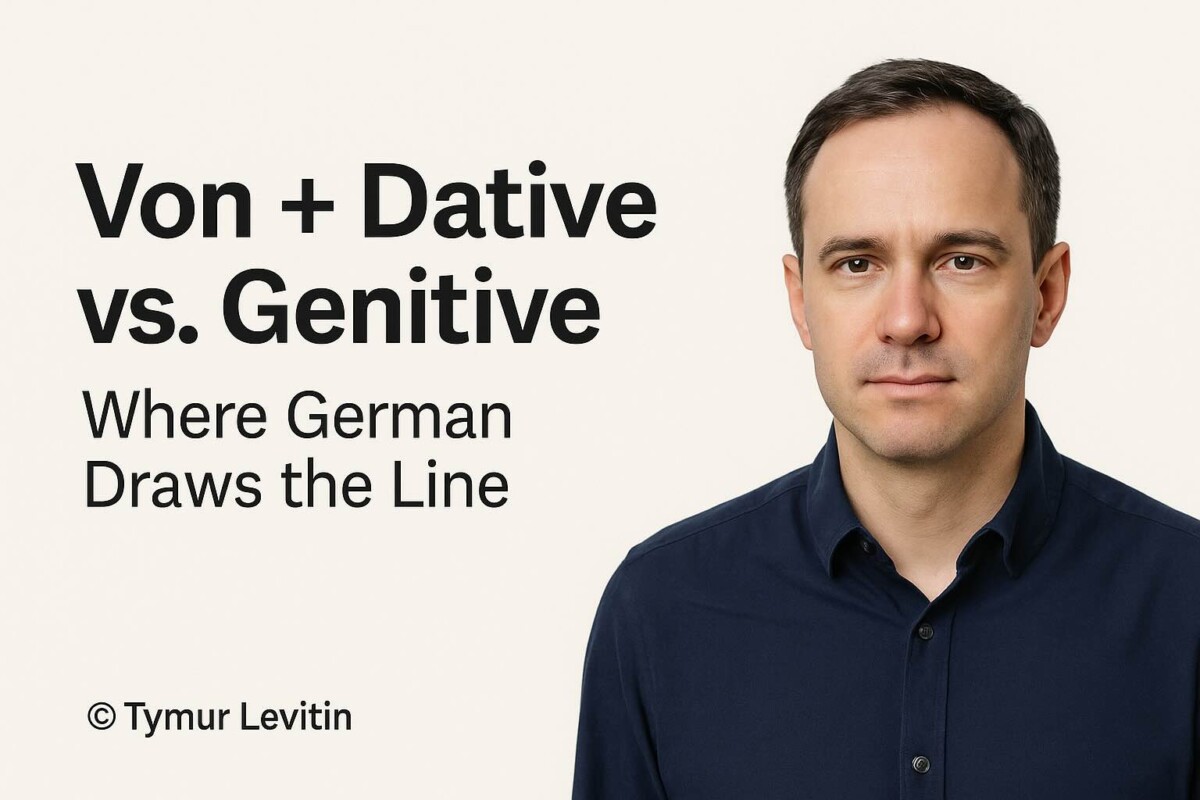Survival Strategies: Exams vs Real Life (The Final, Everything-In-One Edition)
“Grammar is logic, exams are politics. Survive both — and master the language.” - 泰穆尔-列维廷
0) Why this guide exists (the paradox we must live with)
- Logic (linguistics & reference grammar): German verb clusters are governed by structural rules (Ersatzinfinitiv, topological fields, Oberfeldumstellung).
- Method (exam handbooks): to be gradable, many shapes are standardized; “rare but legal” variants are discouraged or marked wrong.
- Reality (speech & translation): native usage often avoids monster clusters, prefers Präteritum 或 paraphrases, and keeps passive where it’s stylistically needed (law/academia).
👉 Survival = know all four perspectives at once: Classical (what’s historically/technically possible), Modern (what mainstream grammars describe), Exam (what is accepted), and Real life (what people actually say and write).
1) The five passives: quick map you can rely on
| Type | Core German shape | What it does | Typical English |
|---|---|---|---|
| Vorgangspassiv (werden + Part. II) | Das Auto wird repariert. | process (“is being repaired”) | “is being repaired” |
| Zustandspassiv (sein + Part. II) | Das Auto ist repariert. | state/result (“is repaired/fixed”) | “is repaired/fixed” |
| Recipient/‘bekommen’-Passive | Der Kunde bekommt das Auto repariert. | recipient focus | “The customer gets/has the car repaired.” |
| Impersonal passive | Es wird getanzt. | activity, no subject | “People are dancing / There is dancing.” |
| Academic passive | Es wird gezeigt, dass … | formal depersonalization | “It is shown that …” |
(Full walkthroughs in Parts 1–9; we summarize here but add all the missing mechanics this article is about.)
2) Ersatzinfinitiv — not just with modal verbs
When a verb that normally forms a perfect with Partizip II governs another infinitive, the standard form is 不 the participle. Instead, the infinitive is used—this is the Ersatzinfinitiv (replacement infinitive).
Applies to three main families (per Duden grammar):
- Modal verbs (können, müssen, sollen, dürfen, wollen, mögen)
- 例如 …, dass er das Buch hat lesen können.
- Perception verbs (sehen, hören, fühlen, spüren)
- 例如 …, dass er sie hat singen hören.
- lassen (let/make)
- 例如 …, dass er das Auto hat reparieren lassen.
请注意: Other grammar sites may talk about this rule, but we refer only to Duden and academic sources.
Primary sources (clickable):
Duden Leseprobe PDF, p.94, “Ersatzinfinitiv”

3) All core tenses with modals (active + passive): exam-safe vs logic vs real life
Below are templates you can copy. “Exam-safe” reflects mainstream grammar + testing practice; “Logic/Classical” notes other analyses you may encounter in scholarly writing; “Real life” offers idiomatic simplifications.
A) Active (no passive)
- Präsens: Er kann das Auto reparieren.
- Präteritum: Er konnte das Auto reparieren.
- Perfekt (Ersatzinfinitiv): Er hat das Auto reparieren können. (exam-safe)
- Plusquamperfekt: Er hatte das Auto reparieren können.
- Futur I: Er wird das Auto reparieren können.
- Futur II:Er wird das Auto repariert haben können.
- (The modal is still the right-edge of the active cluster; wird is finite V2 in the main clause, verb-final in subordinates.)
B) Passive (Vorgangspassiv) with modal
- Präsens: Es kann repariert werden.
- Präteritum: Es konnte repariert werden.
- Perfekt (exam-safe):Es hat repariert werden können.
- Comment: In standard usage and exams, haben is used with the Ersatzinfinitiv group; the auxiliary associates with the modal cluster.
- Plusquamperfekt: Es hatte repariert werden können.
- Futur I: Es wird repariert werden können.
- Futur II (exam-safe):Es wird repariert worden sein können.
- Konjunktiv II: Es würde repariert worden sein können.
Real-life simplification (preferred in speech/writing to avoid stacks):
- Es konnte repariert werden. (Präteritum)
- Or paraphrase: Es war möglich, das Auto zu reparieren.
Why this matters: These are the shapes most exam boards expect. They preserve Ersatzinfinitiv and keep the modal last in the double-infinitive group; in Futur II, wird/würde typically close the entire cluster (see §5–6).
4) Konjunktiv survival (reported speech & irrealis)
Konjunktiv I (reported speech, formal / journalistic):
- Es werde gezeigt, dass …
- Es sei nachgewiesen worden, dass …
- With modal (perfect):
- Es habe repariert werden können. (reported “It is said it could have been repaired.”)
Konjunktiv II (hypothetical / irrealis, especially past):
- Es würde repariert. / Es wäre repariert worden.
- With modal (perfect irrealis):
- Es hätte repariert werden können. (textbook “could have been repaired.”)
Exam survival:
- In practice, habe/hätte … werden können are the tested shapes for perfect passive with modals in K-I / K-II.
- In reported speech, you can also avoid dass and place the finite form right after the subject: Er habe gesagt, … (journalistic convention).
5) After dass: the cluster paradox explained
Learners often think: “All verbs go to the end in a dass-clause.” That’s only part of the story. Inside the verb cluster (right bracket), the order is strictly regulated.
Case 1 – Simple Perfect: Finite auxiliary is last
- Main: Er hat das Buch gelesen.
- Subordinate: …, dass er das Buch gelesen hat. (Correct)
Case 2 – Passive Perfect: Same rule
- Main: Das Auto ist repariert worden.
- Subordinate: …, dass das Auto repariert worden ist. (Correct)
Case 3 – Double-infinitive (Ersatzinfinitiv): Finite auxiliary moves up (Oberfeldumstellung), modal stays last
- Main: Er hat das Buch lesen können.
- Subordinate: …, dass er das Buch hat lesen können. (Correct)
- NOT: …, dass er das Buch lesen können hat.
Case 4 – Passive with modal:
- …, dass es hat repariert werden können. (Correct)
Case 5 – Futur II passive + modal:
- …, dass es repariert worden sein können würde. (Correct — würde closes the cluster)
Explanation (Oberfeldumstellung): In double-infinitive structures, the finite hat/hätte rises to the Oberfeld (top of the right bracket). The modal ends the group.
Primary sources (clickable):
- IDS-Grammis: Oberfeld — the placeholder concept
- Tilman N. Höhle, “Der Begriff ‘Mittelfeld’” (FU Berlin PDF)
6) Small vs Big Auxiliaries — how they shape word order
Small auxiliaries: haben / sein (perfect auxiliaries)
- 在 simple perfect, they appear at the end (…, dass er das Buch gelesen hat.).
- 在 double-infinitive contexts, they move to the Oberfeld (beginning of the cluster): …, dass er das Buch hat lesen können.
Big auxiliaries: werden / würde (future/irrealis/passive operator)
- Often close the cluster in structures like Futur II:
…, dass es repariert worden sein können würde.
Rule of memory:
- haben/sein = open cluster in double-infinitives
- modal = end of the infinitive cluster
- würde/wird = close the entire Futur cluster
7) The four perspectives (Classical vs Modern vs Exam vs Real-life)
A) Classical grammar (broad, descriptive)
- Records older orders like …, dass er das Buch lesen können hat 或 …, dass ich es gemacht habe in more places (and even poetical inversions).
- Useful to 领会 why your intuition sometimes wants to push the finite auxiliary to the very end.
B) Modern standard (Duden / IDS-Grammis)
- Simple Perfect: participle chain + finite last
→ …, dass er das Buch gelesen hat; …, dass das Auto repariert worden ist. - Double-infinitive: Oberfeldumstellung
→ …, dass er das Buch hat lesen können; …, dass es hat repariert werden können. - Futur II (with modal): würde/wird last
→ …, dass es repariert worden sein können würde.
C) Exams (Goethe, TestDaF, DSH, uni writing)
- Follow Modern forms strictly; penalize archaic variation.
- Require Ersatzinfinitiv in all relevant families (modals, perception verbs, lassen).
- In passive + modal perfects expect hat/hatte … werden können in production tasks.
- Test your control over Futur II passive + modal stacks (the “boss fight” of verb order).
D) Real-life usage (news, academia, business, conversation)
- People avoid monsters:
- Es konnte repariert werden > Es hat repariert werden können.
- Es war möglich, das Auto zu reparieren (paraphrase).
- Passive is kept deliberately in academic/legal register (depersonalization), but elsewhere clarity wins.
8) Translation survival (EN / UKR / RU / ES)
- EN: keep be-passive where needed (it is shown that…), but use active/impersonal for activity verbs (people are dancing); get-passive for recipient focus (He got his car repaired).
- UKR: -но/-то and impersonal forms read best; keep formal passive where register requires.
- RU: formal passive exists (Автомобиль был отремонтирован), but active/impersonal is often smoother (Машину отремонтировали).
- ES: se-passive dominates in many slots (Se dice que…, Se repara el coche).
Rule: translate the function (agent suppression, tone, focus), not the metal of the German stack.
9) Exam vs Real-life checklist
On exams, always write
- Ersatzinfinitiv with modals, perception verbs, lassen: hat lesen können; hat singen hören; hat reparieren lassen.
- Passive + modal perfects: hat/hatte repariert werden können.
- Futur II passive + modal: … repariert worden sein können wird/würde (with wird/würde last).
- Reported speech: Es werde gesagt, er sei …
- Agents: von + Dat where relevant.
In real life, prefer
- Präteritum where possible: Es konnte repariert werden.
- Impersonal & paraphrase: Man sagt … / Es war möglich, …
- Mark state vs process correctly: ist repariert vs wird repariert.
Appendix A — Verb clusters: operators, operands, Oberfeldumstellung
- Verb cluster = sequence of verbs at the end of a clause, e.g., …, dass es hätte repariert werden können.
- Operator = governs another verb (e.g., haben, sein, können, werden).
- Operand = the governed verb (e.g., lesen, reparieren).
- Classical order: operand before operator (gelesen habe).
- Modern double-infinitive rule: operator moves into Oberfeld leading cluster, e.g., … hat lesen können.
Primary sources (clickable):
Höhle, “Der Begriff ‘Mittelfeld’” (PDF)
Appendix B — All the templates (copy-paste safe)
1) sehen/hören/fühlen/lassen (Ersatzinfinitiv)
Main clause
- Er hat sie singen hören.
- Er hat das Auto reparieren lassen.
Subordinate (after dass)
- …, dass er sie hat singen hören.
- …, dass er das Auto hat reparieren lassen.
2) Passive + modal (all tenses)
- Präsens: Es kann repariert werden.
- Präteritum: Es konnte repariert werden.
- Perfekt: Es hat repariert werden können.
- Plusquamperfekt: Es hatte repariert werden können.
- Futur I: Es wird repariert werden können.
- Futur II: Es wird repariert worden sein können.
- Konjunktiv II (Futur II): Es würde repariert worden sein können.
Subordinate (after dass)
- …, dass es hat repariert werden können.
- …, dass es repariert worden sein können würde.
3) Reported speech (Konjunktiv I) — passive
- Es werde gezeigt, dass …
- Es sei nachgewiesen worden, dass …
- Es habe repariert werden können.
4) Hypothetical (Konjunktiv II) — passive
- Es wäre repariert worden.
- Es hätte repariert werden können.
- …, dass es hätte repariert werden können.
Appendix C — Who needs Ersatzinfinitiv? A practical list
- All modals: können, müssen, sollen, dürfen, wollen, mögen.
- Perception verbs: sehen, hören, fühlen, spüren (also colloquial riechen, schmecken in some contexts).
- lassen (in the “let/make” sense).
- Complex movement + perception/causative combos: kommen/gehen + lassen/sehen/hören → still double-infinitive (“hat kommen sehen”, “hat gehen lassen”).
实例
- …, dass er es hat kommen sehen.
- …, dass sie ihn hat gehen lassen.
Appendix D — FAQ: common mistakes explained
1) “In dass-clauses, shouldn’t hat be last?”
- 是 于 simple perfect: … das Buch gelesen hat.
- 没有 于 double-infinitive contexts: … das Buch hat lesen können (Oberfeld).
2) “Why is the modal always last?”
- The modal is the highest operator of the infinitival group; it closes the group: … lesen können; … repariert werden können.
3) “Where do wird/würde go?”
- 在 Futur/Futur II clusters, wird/würde typically closes the entire stack: … repariert worden sein können wird/würde.
4) “Can I use worden können?”
- 没有 in perfect + modal passive: exams & modern usage require werden können (Ersatzinfinitiv); worden belongs to Futur II passive scaffolding (… worden sein …), not to the modal bundle.
5) “Is there any place for gemacht habe / lesen können hat?”
- Classical/poetic/archaic usage documented by historical grammars — not exam-safe. Stick to modern/IDS patterns.
Sources (primary, clickable)
- Duden (Ersatzinfinitiv, with examples) - Ganz einfach! Deutsche Grammatik, Leseprobe (PDF), p. 94.
👉 https://shop.duden.de/media/02/88/fd/1687432582/Leseprobe_9783411743230_Ganz_einfach%21_Deutsche_Grammatik.pdf - IDS-Grammis (Verb complex & word order in the right bracket) - Der Verbalkomplex (systematische Grammatik).
👉 https://grammis.ids-mannheim.de/systematische-grammatik/415 - Tilman N. Höhle (topological fields / Mittelfeld) — FU Berlin (PDF).
👉 https://refubium.fu-berlin.de/bitstream/handle/fub188/21919/149-3-998-1-10-20180306.pdf
(Secondaries you may search yourself if you wish: German StackExchange discussions on Ersatzinfinitiv and Oberfeldumstellung; teaching sites that illustrate the same rules — not linked here.)
Series Navigation
- Part 1: The Myth of Three Passive Forms
- Part 2: Passive Tenses Without Modals
- Part 3: Passive with Modal Verbs
- Part 4: All Tenses in Full
- Part 5: Recipient Passive
- Part 6: Impersonal Passive
- Part 7: Passive in Konjunktiv
- Part 8: Academic Passive
- Part 9: The Translation Lab
- Part 10: Survival Strategies (this page)

About the author
泰穆尔-列维廷 — Founder, Head Teacher & Translator
© Tymur Levitin — Levitin Language School / Start Language School by Tymur Levitin
全球学习。个人方法。
























